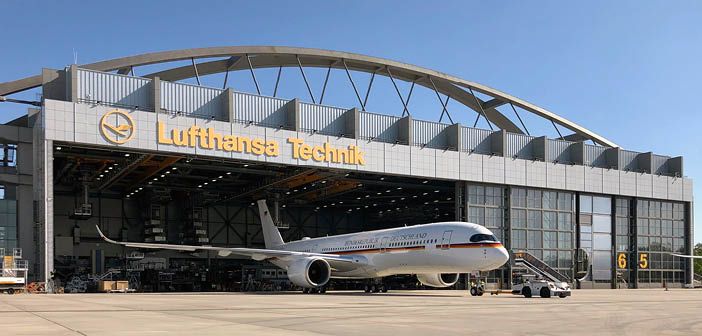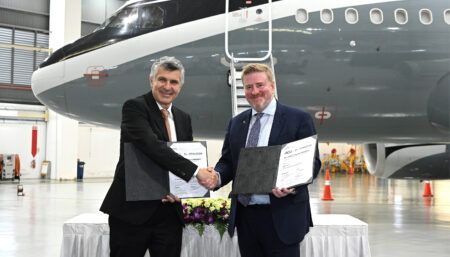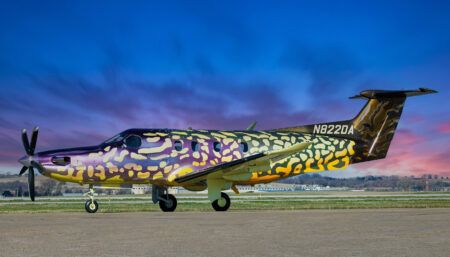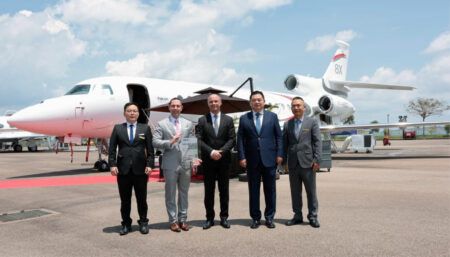Michael von Puttkamer, head of operations, and Wieland Timm, head of sales, share how Lufthansa Technik’s VIP & Special Mission Aircraft Services product division has reacted to the COVID-19 pandemic.
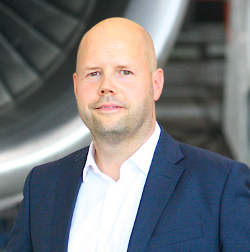
Have you been able to stay open/offer your full array of services throughout?
von Puttkamer: Our VIP & Special Mission Aircraft Services product division has been and is currently operating at a stable level. Since our projects are planned well in advance, we are not experiencing changes in project schedules in our hangars at the moment. For now, all current projects are continuing as planned.
What new operational procedures have you implemented?
von Puttkamer: To implement the mandatory social distancing measures for employees, the division switched from a two-shift to a three-shift schedule. That means we have fewer people working on the aircraft at the same time. During shifts, our colleagues split by working on either the front or the back of the aircraft and only two people are involved in the shift handover. In addition, staff were provided with nose/mouth masks for tasks or working situations for which social distancing cannot be guaranteed (for example, cockpit checks).
How has demand been impacted, both in terms of work volume and the type of work?

Timm: Demand from the customer side hasn’t changed much. So far we have not seen any special requests related to the current situation. The only difference is that the final cabins now receive a special precautionary disinfection treatment before being handed over to our customers.
Have you had staffing challenges?
von Puttkamer: Due to travel restrictions in many countries, some of our mechanics that were stationed at our customers’ bases overseas had to return to Germany.
Have you had supply chain challenges?
von Puttkamer: It is a big advantage that we manufacture our cabin interiors ourselves and have our own workshops for components such as engine and landing gear overhauls at our Hamburg base. Moreover, most of our materials are collected ahead of project start. Some supplies – for example seats, carpets and other inventory – are currently delivered as expected. There may be slight delays for special goods due to fewer and more expensive freight connections. We are in close contact with all suppliers to try to mitigate the effects of the crisis in cooperation with them.
What other challenges have you faced?
von Puttkamer: Some of our customers or their representatives cannot be on-site in Hamburg due to imposed travel restrictions and therefore cannot personally monitor the project progress as they usually would.
Have you benefitted from state support?
Timm: Completions and maintenance on state-owned/head-of-state aircraft continues as planned, but we did not receive any additional state aid.
Are there any actions you would like to see from regulators, suppliers or government?
Timm: No special actions, we just hope that the current situation will not lead to the postponement of any work already contracted, so that stable business planning is still achievable.
Have you adapted to make more use of technological tools?
von Puttkamer: We already made good use of collaborative tools, such as using augmented reality to virtually visualise the 3D design data of planned cabin interiors in empty aircraft fuselages. By means of a high-bandwidth live data transmission for which we employed our own 5G campus network, the technicians on site always have the opportunity to check the current position of all planned components and, additionally, to coordinate any necessary changes with the developers through collaborative video. This vastly improved coordination between engineering and production teams, and moreover helped our colleagues to adhere to the current social distancing rules.
Timm: Our digital operations suite, Aviatar, also proved very valuable, as it enables us to monitor and document the entire status and progress of a layover remotely for the customer, who can in turn approve certain milestones remotely, from anywhere in the world.
Are there changes you’ve made that you think will be permanent?
von Puttkamer: The aforementioned collaboration tools will surely stay in use after the pandemic, as they provide great benefits even during normal operations.
Timm: Businesswise, we can imagine that we might see some impact of the crisis in the medium term, as aspects like home office and video conferencing could become more and more the standard in some industries, eventually reducing or replacing business travel on corporate and private jets.
Do you think there will be any long-term changes to the industry going forward?
Timm: I could well imagine that the industry might see some changes if the tough times for aviation drag on, for example possible bankruptcies of suppliers or completion centres. The adjusted capacity will then also have an impact on the supply of key components like seats and galleys.
Are you planning any adjustments to your in-house operations in light of these predictions?
Timm: We already consider ourselves the leader in terms of in-house resources and capacity for VIP completions and we have achieved this by constantly innovating and adapting our completions business to the most recent developments, not least with regards to technology. We will of course continue to do so to maintain our advantage and I am confident our customers will value it.
Has your company been involved in community support projects in response to COVID-19?
von Puttkamer: Our textile workshops have produced significant amounts of face masks during the crisis, for internal use.
Please see the July 2020 issue of Business Jet Interiors International for a full report on how completion centres around the world have responded to the COVID-19 pandemic.


